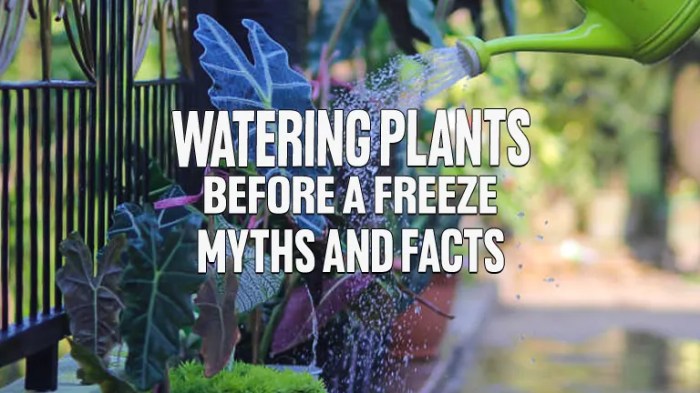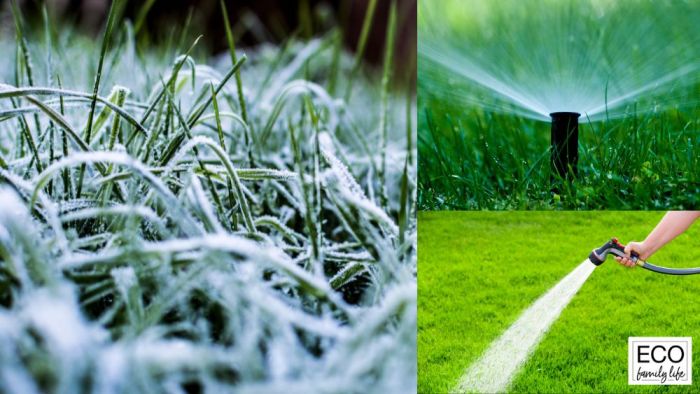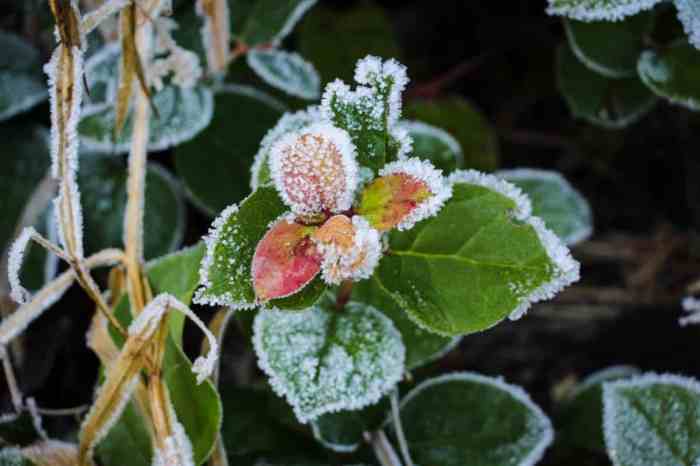Should You Water Plants Before a Freeze?
Watering Plants Before a Freeze: Should You Water Your Plants Before A Freeze
Should you water your plants before a freeze – Protecting your plants from freezing temperatures requires careful consideration of their water needs. Overwatering or underwatering can both lead to significant damage, making pre-freeze watering a crucial step in winter plant care. This guide provides a comprehensive overview of how to properly water your plants before a freeze, considering various plant types, soil conditions, and watering techniques.
Plant Type and Water Needs Before a Freeze
Different plant types have varying water requirements, particularly before a freeze. Understanding these differences is essential for protecting your plants. Hardiness zones also play a significant role, influencing a plant’s tolerance to cold temperatures and its pre-freeze watering needs. Container plants require a different approach than in-ground plants.
| Plant Type | Water Needs Before Freeze | Rationale | Potential Consequences of Over/Underwatering |
|---|---|---|---|
| Succulents | Minimal watering; allow soil to dry completely | Succulents store water in their leaves and stems; excess water can lead to root rot in cold temperatures. | Overwatering: Root rot; Underwatering: Wilting and reduced cold hardiness |
| Herbs (e.g., rosemary, thyme) | Moderate watering; ensure soil is moist but not soggy | Herbs generally tolerate drier conditions but need some moisture for protection against frost. | Overwatering: Increased susceptibility to fungal diseases; Underwatering: Wilting and reduced cold hardiness |
| Vegetables (e.g., kale, spinach) | Moderate to high watering; maintain consistently moist soil | Vegetables generally require more moisture to maintain vigor and cold hardiness. | Overwatering: Root rot; Underwatering: Stunted growth and increased susceptibility to frost damage |
A plant’s hardiness zone dictates its tolerance to cold temperatures. Plants in colder zones may benefit from slightly more pre-freeze watering to increase their cold tolerance, while those in warmer zones may need less. Container plants are more susceptible to freezing temperatures than in-ground plants because the soil in containers cools down faster. Therefore, container plants may need slightly more protection and potentially more frequent watering before a freeze to maintain adequate soil moisture.
Soil Moisture and Freezing Temperatures, Should you water your plants before a freeze

Source: forestry.com
The relationship between soil moisture and plant damage during a freeze is significant. Frozen soil can damage or destroy a plant’s root system. Different soil types affect water retention, requiring adjustments to pre-freeze watering strategies.
Imagine a root system in frozen soil. Ice crystals form within the soil, expanding and damaging delicate root cells. This physical damage prevents the roots from absorbing water and nutrients, leading to plant stress and potential death. In sandy soil, which drains quickly, water needs to be applied more frequently, while clay soil, which retains water well, requires less frequent watering before a freeze.
To check soil moisture, insert your finger about an inch into the soil. If the soil feels dry, it’s time to water. If it feels moist, wait before watering. This method ensures you avoid overwatering and provides a reliable measure of soil moisture.
Watering Techniques and Timing

Source: ecofamilylife.com
Different watering methods have varying effectiveness before a freeze. Timing is also crucial for minimizing ice formation on plant leaves.
- Deep watering: Soaks the soil deeply, encouraging stronger root growth and improved cold hardiness. This is generally the preferred method before a freeze.
- Surface watering: Only moistens the top layer of soil; less effective in protecting plants from freezing temperatures as it doesn’t provide sufficient moisture to the roots.
The optimal time to water is during the late morning or early afternoon. This allows the soil to absorb water and the plants to dry somewhat before nightfall, reducing the likelihood of ice formation on leaves.
To prevent ice formation, avoid watering in the evening. If you must water later in the day, ensure the plants have sufficient time to dry before temperatures drop below freezing.
Protecting Plants from Freezing Temperatures

Source: gardeningmentor.com
Besides proper watering, several methods can protect plants from frost damage. These methods provide additional layers of protection, enhancing the plants’ chances of survival during a freeze.
| Protection Method | Description | Effectiveness | Suitability for Different Plant Types |
|---|---|---|---|
| Mulching | Applying a layer of organic material (e.g., straw, shredded leaves) around the base of plants. | High; insulates the soil and protects roots from freezing. | Suitable for most plant types. |
| Covering | Using blankets, sheets, or row covers to protect plants from frost. | High; creates a microclimate that protects plants from freezing temperatures. | Suitable for most plant types, especially tender plants. |
| Protective Barriers | Creating a physical barrier around plants using materials such as cardboard boxes or plastic containers. | Moderate; provides some protection from wind and cold. | Suitable for smaller plants and shrubs. |
A simple protective barrier can be created using readily available materials like cardboard boxes or plastic containers. Place the container over the plant, ensuring adequate air circulation to prevent moisture buildup and potential fungal diseases.
Adequate drainage is crucial after a freeze to prevent root rot. Ensure excess water can drain away from the plant’s base to prevent waterlogging.
Post-Freeze Plant Care
Assessing plant damage, pruning, and adjusting watering schedules are essential steps in post-freeze plant care to promote recovery.
After a freeze, carefully inspect your plants for signs of damage, such as wilting, browning, or leaf drop. Prune any frost-damaged stems or leaves, cutting back to healthy tissue. Avoid pruning until the danger of further freezing has passed. Gradually resume your regular watering schedule, adjusting as needed based on the plant’s recovery and soil moisture levels.
Question & Answer Hub
Can I water my plants the day before a freeze?
It depends. Deep watering several days before a freeze is generally recommended for established plants in the ground, but avoid watering right before a freeze as this can increase ice formation on the leaves.
What if I forget to water before a freeze?
While pre-freeze watering is beneficial, it’s not always essential. Plants may still survive if you forget, especially if the soil is already moist. Prioritize other protective measures like mulching and covering.
How do I know if my plants are frost damaged?
Signs of frost damage include wilting, discoloration (brown or black), and mushy or limp leaves. Assess your plants carefully after a freeze to determine the extent of the damage.
What kind of mulch is best for frost protection?
Organic mulches like straw, leaves, or pine needles are effective insulators. Avoid using plastic sheeting, which can trap moisture and lead to rot.




















